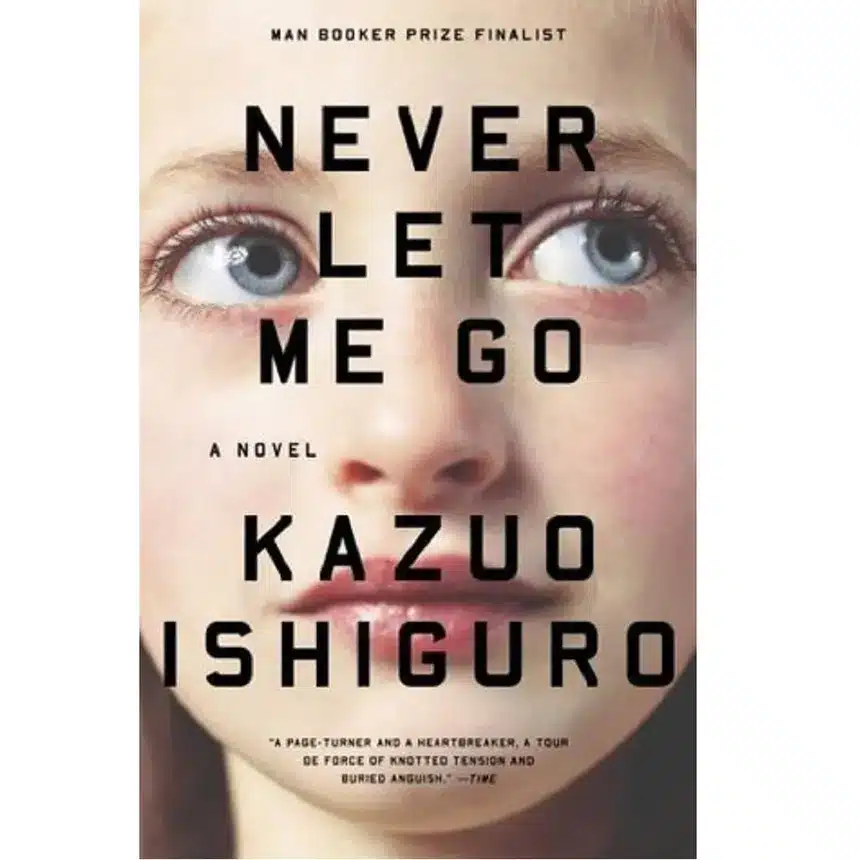Recently Patrick Macfarlane, my fellow, fellow at this dear Institute discussed on his Vital Dissent podcast the Kazuo Ishiguro novel, Never Let Me Go. In his books Ishiguro frequently covers memories, relationships and the human condition. Never Let Me Go, is a dystopian book on the meaning of individual life and how systems, hierarchies and society itself can value and categories people based on collective and ideological needs.
I suggest listening to Patrick’s podcast for an in depth break down. I will not reveal any spoilers. Only, care to elaborate and expand on certain themes. I read this book over a decade ago, just after reading The Master and the Margarita by Mikhail Bulgakov. For me both books are entwined, only out of my own personal chronology in reading them. I had barely digested, or had time to think about one, as soon as I started the other. So, while reading Ishiguro, the words and concepts raised by Bulgakov kept bubbling from within my mind. Both have themes of love, relationship and good and evil.
In Bulgakov’s book, time switches from ancient to the 1930s. For Ishiguro, time is far more personal, it’s scarce. The books premise is about the sanctuary of time frames, the precious attachment that characters have with time itself.
Then, Patrick mentioned on his podcast, a personal and intimate attachment to time for him. He is a lawyer, he works hard, long arduous hours away from his family. He mentioned an incident while on holiday, when his wife noticed on the last day his mood dimmed. She asked him, “why?”
“Because tomorrow we have to get up at five in the morning and go back,” Patrick replied.
Go back.
Back, to the life he had worked so hard to build. He studied to become a lawyer. Dedicated himself to the profession, then he had to find a job, build a reputation and navigate the contrived landscape of careerism, entrenched professionals and his own principles as man. All the while, a father, husband, son and friend, the relationships on the outside. It was returning to that world, that in this anecdote, in this memory, in this moment of time, that made him sad.
To be on holiday, that reprieve of comfort, relaxation and to spend it with those we love is precious. It’s what many work so hard and sacrifice for. It’s a reality that some understand. Others, take for granted.
The sentimentality of love, the most fundamental narrative arc in many fictions, is that holiday for the protagonists in Never Let Me Go. It’s tender but bitter sweet. Short lived. Time, as we all know is a constant that goes by, for the characters in the book it’s not the time of nature that threatens their love. It’s the time frame imposed by the government of the book. The rules that serves some, profits them. But imprisons others. In this world, in the books fictional reality, this is for some greater good.
The Master and Margarita, is a book about good and evil. It has theological themes and humanises the devil, in the sense that he appears as a professor in 1930s, Soviet Russia. Written from within the tyranny of the USSR, a book that emerged like a flower blossoming from within the very real dystopia of ideological evil. The protagonists in Never Let Me Go, have no parents. They can not have children themselves. They exist as a utility. In the Soviet Union of Bulgakov, the state is mother Russia. Every person exists to serve the government. They breed, have children, families who all belong to such a State.
Humanity is capable of many things, artistic expression of human imaginings and imperial governance that constricts, manipulates and violates the individual. One, celebrates the individual, after all, it’s from one mind that it arises, seeks, asks, answers and challenges. The other, is a mob of hidden planners and doers who only do because they are paid to do so, the outcome is never as promised, but always ensures that the planners and doers must apply indefinitely while they profit all the more for it.
Margarita is the Master’s lover, the devoted. Obedient to the Master. In Never Let Me Go, the protagonists only know a life of obedient existence. It questions autonomy, agency of self. Humans do not exist solitary, we are social beings. But, does that justify coercion and organisations that rule over individuals and assumes to know how best to dominate their lives? Ideologies claim, yes. The antagonists in Never Let Me Go, would also say yes. The victims, those who want to be free, the protagonists, they have no choice but to suffer that, ‘yes’ decision made despite them by those who benefit from their subjugation.
Salvation is trapped in snippets of time, each memory, a reflection of a past when we were free, or at the very least had experiences where we over came, endured and pulled through. The moments we may ponder with affection are intimate, tender, sentimental, lost but for our own memories. That is the Never Let Me Go. Never let the memories go, the feeling. The love.
My thoughts on these two books, especially while omitting what happens, does nothing to help you understand an inner impression that reading such a thing had for me. Or Patrick for that matter. That I recall the Shostakovitch playing as I read Bulgakovs words or the taste of white tea while I pondered Ishiguro’s, are rather superficial. Or, that in listening to Patrick discuss the book as I worked snapped me back to both works, is again personal. That is the power of words, narratives, novels. They are different for each one of us. Memories from within our own life, twisted into the story invented by an author who we likely shall never meet, yet has implanted thoughts and feelings deep into our mind.
Maybe, in time the dystopia that writers such as Ishiguro warn us about will lurk beyond the mind. Perhaps to think, ponder, let alone discuss divisive or controversial matters is forbidden, or worse forgotten. The mundane of things, we now take for granted. Let alone the concepts of evil or good. The memories of dissent, the love for liberty, freedom, forgotten. The love of the natural spirit, unlearned. Gone.
When Kazuo Ishiguro was asked why his characters don’t run away he answered, “…usually what happens is that people accept the hand that they have been dealt and try and make the best of it. I mean, throughout history people have remained in terrible marriages. They have done awful jobs all through their lives. Millions of people throughout history worked in ghastly mines or factories, including small children. Millions of people worked and died as slaves. Many, many people over the years fought in wars that they didn’t believe in or didn’t understand anything about. The fascinating thing for me is the way people respond to being dealt a really bad hand. And sometimes it seems to me that if that’s all you know, if that’s the world you’ve grown up in, you can not see the boundaries for which you have to run. You can not see what you have to rebel against, and instead you just try, sometimes heroically to find love, friendship, something meaningful and decent within the horrific fate that you’ve been given. That’s the only answer I can usually offer when people say, “why don’t the characters in Never Let Me Go run away?”
It’s why most of us don’t run, can’t run. To where? To what?
It’s what we know. It’s home. It’s the artificially conceived obligation we must return to. The holiday is the unreal, the abnormal. At least for men who do and work, like Patrick. It’s why such a memory is fond. Precious. Why he will Never Let it Go.
Why is it acceptable to oppress? To deny autonomy? To incrementally, or absolutely devour liberty, choice, freedom, self agency? A greater good? The religion of the social contract? The original sin for governance.
Run away to where? If we did, we would be obligated, nay, forced to return. Like the protagonists in Never Let Me Go, the bitter acceptance is in knowing that some of us are owned, The others, they don’t care, they can’t care that the systems they depend on, or take for granted crush and destroy. They are separated by habit, a normalcy of it all.
The evil in Never Let Me Go, had their reasons and with all dystopia, tyrannies and oppressors it does benefit some. Profit them, uplift them. Is it moral if it forces others? If it exploits them and does so at the expense of their liberty and individual freedom?
We don’t need the devil. A Master to have evil, or to impose it. To be evil. Humans are very much capable of it on their own. The masterful truth of it, it’s so possible because they don’t believe that they are evil.
The reality is that many are the antagonists, or at least desire with or profit alongside them. The protagonist, the dissident, the hero, as in the fictions are few. As in life, the greater good, is not a moral declaration. It’s an out. An allowance to do evil. No devil, just human inventions. Ideology. Entitlement.
That’s why they don’t run. They can’t.
You won’t let them go anyhow.






























